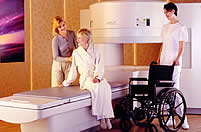


FAQS
|
||
MRI stands for Magnetic Resonance Imaging. An MRI offers a safe and efficient method for medical diagnosis of many conditions, without the use of harmful x-rays. In many cases, MRI can lead to early detection and treatment of disease without surgery or biopsy. It is a noninvasive method of examining the soft tissue of the body including organs, muscles and tendons.
2. Is MRI safe?
The strength of the magnetic field and the frequency of the radio waves have no known harmful effects. However there are some patients who cannot have an MRI test due to certain medical conditions such as pregnancy and metallic or electronically implanted devices. Not all metallic implanted are contraindicated for MRI. Consult your doctor or MRI Technologist for clarification.
|



3. I have heard that MRI's can make you feel claustrophobic?
This is a common occurrence with the "tunnel" style MRI's. Our OPEN MRI system is spacious, comfortable and quiet. Most patients who could not tolerate the "tunnel" have no trouble, and do not feel claustrophobic in the OPEN MRI.
4. What if I'm a bit heavy or can't tolerate closed spaces (claustrophobia?)
Our MRI system is open on all sides making it airy, bright, and OPEN. You should not have that "closed-in" feeling. The openness allows a friend or family member to sit with you, even hold your hand. Our scanning table has no weight limit. Patients are made comfortable with the help of cushioned pads, pillows and specially formed sponges.
5. Does my doctor need to refer me for an MRI?
In order to perform the study we need a referral from your physician. Your doctor will provide us with the necessary information to perform the most accurate study.
6. How do I prepare for an MRI Scan?
You will not have any restrictions on eating or drinking before your scan. (Certain scans regarding the abdomen or pelvis might have restrictions.)
We have dressing rooms for your personal belongings, clothing, jewelry and other metallic items. Jewelry and other metallic items should be kept at a minimum because it might interfere with the scan. Clothing with zippers, hooks and snaps will need to be removed. We have gowns and scrubs for you to change into. If you prefer, you may wear your own sweats, shorts or other loose clothing.
7. What happens during an MRI Scan?
You will be asked to lie down on the scanning table, usually on your back. We will make you comfortable with the aid of pillows, blankets and sponges. A MRI coil is placed around the part of the body to be scanned. This acts as an antenna directing the magnetic energy to that area. You will be asked to lie still for the duration of the scan approximately 30-45 minutes. You will hear the faint knocking sound while the system is scanning.
8. Will I hear any noise during the scan?
You will hear a variating knocking sound during the scan, which is a bi-product of the scan process. Earplugs are available, and we will provide an assortment of music to help you relax. You are also welcome to bring your own CD or cassette! There is a two-way intercom system providing communication between you and the technologist.
9. What do I need to tell the technologist before the scan?
Advise the technologist of any pacemaker, or other implanted devices in your body. Also make the technologist aware of any previous surgeries, including heart surgery for pacemaker or other implanted devices, brain surgery for aneurysm clips, back surgery, cochlear implants, pregnancy, history of working with metal, or in the metal trades.
10. How soon will I receive the results of my MRI?
Our policy is to have a preliminary report faxed to your doctor as soon as the radiologist reads your film, usually the same day. The full, transcribed report is sent to your doctor the next business day.
11. Is the Image Quality the same as a Closed MRI?
Yes, the images from our Hitachi OPEN MRI Systems are comparable to the images from a closed system. Using state-of-the-art technology and aggressively pursuing the latest protocol developments have dramatically improved the quality of scans generated by Open Advanced MRI.
12. Are there any people who cannot, or should not have an MRI?
MRI poses no danger to the majority of patients. Certain medical conditions will prevent someone from having an MRI. The strong magnetic field can cause disruption to internally placed devices such as pacemakers, heart valves, aneurysm clips.
13. Can my child have an MRI?
Yes, your child can have an MRI. Children under 5 years old are generally given a mild sedative during the scan to keep the child from moving. With the open MRI system, a parent may stay in the scan room with the child, and hold their hand during the scan. This is a great way to relieve any apprehension the child or the parent may have about the procedure.
14. What if I'm pregnant?
MRI is usually not recommended for pregnant patients, particularly in the first trimester, although there are no known side effects from MRI.
15. Who Interprets the MRI Scan?
A board certified radiologist is a medical doctor specifically trained to read diagnostic images including X-rays, CAT Scans, Ultrasounds and MRI's.
|

